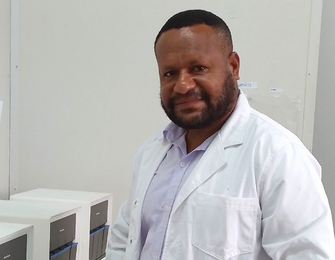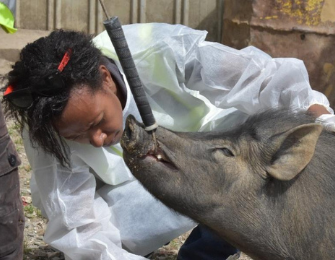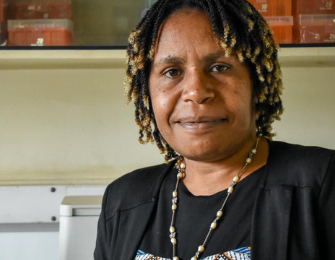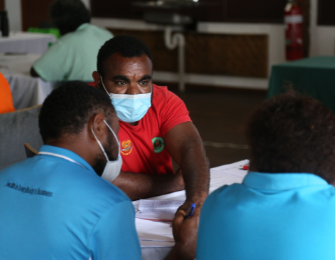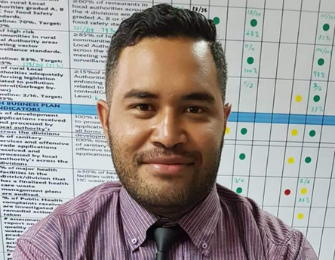
What is your current role?
My current role is the National WASH (Water, Sanitation & Hygiene) Coordinator for the Ministry of Health & Medical Services, and the Fiji WASH Cluster Coordinator (Emergency/Disaster Response).
I am responsible for managing and implementation of the Ministry’s WASH Program and the Fiji WASH Cluster operation. This includes, but is not limited to, coordination of WASH activities in Schools, Communities, Health Care Facilities, Emergencies (i.e., COVID 19 Pandemic and Natural Disaster response) and development of WASH policies and guidelines.
The nature of my work requires me to function reliably both in normal and emergency response situations.
What drew you to work in health security?
Health Security and Public Health captivates me in so many ways and I made that choice to work in that area based on the following:
• Impactful - I want to make an impact through my efforts on the lives of communities, overall health of the nation and global population health. My area of specialization is WASH and my goal is to ensure that my work contributes to the realization of SDG Goal 6.
• Personal Satisfaction and Rewarding – It gives me personal satisfaction knowing that I’ve had an impact on the health of others especially those who have been affected by natural disasters and the COVID 19 pandemic.
• Excitement and Interesting – I had lots of excitement especially when I’m out working in the field and meeting people. It is interesting because I get a chance to do work with the community, networking with partners, able to collect and process a huge amount of information and work towards improving the health of the world.
• Job Security – I believe it is one of the fields that provides stability and job security. A typical example is during the COVID 19 pandemic when most workers in other areas were rested or laid off, Public Health officials were doing what was expected from them.
• Challenging – It is challenging primarily because we deal mostly with human beings and the ongoing efforts towards encouraging health seeking behaviours. The challenges inherent in the public health field ensure that while working in it I’m constantly able to find motivation.
How does your work impact people’s lives?
My work can impact people through the following avenues:
- Securing WASH supplies and resources from Donors and development partners in preparation and response to natural disasters and the COVID 19 pandemic.
- Coordinating response activities and the distribution of these WASH supplies to people affected by natural disaster and COVID 19 pandemic. To ensure their WASH needs are met within a required timeline.
- Developing WASH Policies, Guidelines and Manuals to address WASH issues, standards and behaviours in Schools and Communities. e.g., WASH in School Policy, Community health Workers Manual.
- Ensure effective implementation of WASH activities such as Drinking Water Safety & Security Planning (DWSSP) & Sanitation improvement projects in rural and vulnerable communities.
- Obtaining funding support and resources from Donors and development partners towards improving WASH facilities/infrastructures in communities and informal settlements.
- Advocate and collaborate on efforts to address Menstrual Hygiene Management needs of women and girls.
- Working with academia and development partners (e.g., Watershed Interventions for Systems Health) on collaborative research on WASH.
 How does collaborating within your country or the Pacific region help your work?
How does collaborating within your country or the Pacific region help your work?
A key element of my experience has been networking, partnership building and collaboration with key partners in government, civil society organizations, special interest groups (e.g., Fiji Disabled Association), academia, development partners and donor agencies in the WASH Sector in Fiji and abroad. Working with these external organizations has allowed me to establish new, and strengthen existing networks, especially within the Fiji WASH Cluster platform.
The value of this networking becomes apparent when it comes to responding to Natural Disasters, Communicable Disease Outbreaks, and the ongoing COVID 19 pandemic. Through this organized collaboration, it helps my work program to develop and mobilize WASH interventions rapidly to affected areas, households, or populations. This experience has given me a new appreciation of the value of effective collaborations and partnerships. This is especially important in resource limited settings such as ours.
Moreover, I have in past been able to establish networks with WASH cluster coordinators in other Pacific Island Countries, particularly Vanuatu, resulting in adoption of a ‘twinning program’ between the two countries.
What are some of the challenges you face in your work?
Key challenges that I encountered with my work are:
- Limited resources (funding and supplies) to address the WASH needs of people both in normal times and emergencies (disasters and pandemics).
- Increased workload when responding to disasters (i.e., cyclones). An unforgettable experience was when we had the “dual crisis” in the form of COVID-19 and Tropical Cyclones (TC Harold and TC Yasa). It can be quite overwhelming.
- Stakeholders Interaction - Interacting with WASH Cluster stakeholders who have different priorities and areas of expertise during WASH Cluster Meetings and response efforts is always complex and difficult. This is where good communication and negotiation skills is applied.
- Collaboration with Key Government Agencies on WASH to address some Governance Issues on WASH.
- Increased frequency and Magnitude of Cyclones, Floods and Outbreaks of Communicable Diseases in the past 2 years in addition to COVID 19 response has an impact on the slow implementation of our yearly Business Plan/Planned activities, stressed my program resources allocation/budget, divided my program efforts.
What is most rewarding about your work?
- Ability to make change in people’s lives and their living conditions through improvement of WASH facilities or providing provisions of WASH products.
- Maintaining a healthy working relationship and partnership with communities, all levels within Government structure, developments partners, donors, civil society organizations and academia.
- Working on innovative WASH products such as field latrines.
The Centre supports Suli’s work through the Watershed Interventions for Systems Health (WISH Fiji) project.

